When it comes to real estate development, one of the key challenges that developers often encounter is the uncertainty surrounding project costs.
This uncertainty stems from various factors, with high-interest rates being a significant contributor to the fluctuations in costs and the resulting delays in project completion.
As someone deeply involved in the real estate industry, it is imperative to address these challenges and their impact on both developers and potential buyers.
Challenges in Estimating Project Costs
Developers face an uphill battle when it comes to accurately estimating project costs. The volatile nature of the real estate market, coupled with external factors such as high-interest rates, makes it difficult to predict and plan for expenses effectively.
This uncertainty can lead to budget overruns, delays in construction, and ultimately impact the overall success of a project. As a developer, this constant challenge of staying within budget while delivering a high-quality product can be a source of immense stress and frustration.
As a developer, this constant challenge of staying within budget while delivering a high-quality product can be a source of immense stress and frustration.
Fluctuating Costs and Delays in Completion
The high-interest rates prevailing in the market play a significant role in the fluctuation of project costs. These rates directly influence borrowing costs for developers, impacting their ability to secure funding at favourable terms.
As interest rates rise, so do borrowing costs, leading to increased project expenses. This, in turn, can result in delays in project completion as developers struggle to cover the escalating costs.
The ripple effect of these delays is felt throughout the industry, affecting construction timelines and potentially compromising the quality of the final deliverable.
Affordability Concerns for Buyers
As developers adjust prices to cover the rising project costs, the affordability of properties becomes a growing concern for potential buyers. The real estate market relies on a delicate balance between supply and demand, and when prices soar due to increased project expenses, buyers may find themselves priced out of the market.
This affordability crisis not only impacts individual buyers but also has broader implications for the health of the real estate sector as a whole. As someone passionate about creating opportunities for homebuyers, finding solutions to address these affordability concerns is crucial.
As we navigate the complexities of real estate development, it is evident that tackling the uncertainty in project costs requires a multifaceted approach. By addressing the challenges in estimating costs, advocating for more stable interest rates, and exploring innovative financing options, we can work towards creating a more sustainable and affordable real estate market for all stakeholders.
Role of Government and Mortgage Banks
The distrust among stakeholders within the market has resulted in a challenging environment where prices fluctuate uncontrollably, making it difficult for the average Nigerian to afford a property.
In order to combat these issues and bring about a more stable and trustworthy real estate market, it is imperative for the government to intervene with effective policies. By implementing and enforcing regulations that promote transparency and fairness, trust can be gradually restored among market participants.
Furthermore, it is essential for mortgage providers to re-evaluate their funding options and offer more patient-centric solutions that will allow them do core mortgage banking.
By extending more flexible and accessible mortgage terms and unnecessary charges, homeownership can become a tangible reality for a broader range of Nigerians, thus addressing the affordability crisis prevalent in the market.
Alternative Mortgage Solutions
As a real estate professional, I recognise the urgent need for innovative solutions to tackle the challenges posed by market instability and pricing disparities. My company is actively working towards providing alternative mortgage products that cater to the specific needs of our clients, aiming to bridge the gap between affordability and property ownership.
Moreover, mortgage play a fundamental role in reshaping the accessibility landscape of homeownership due to its long term arrangement and patient funding is required to make it sustainable.
It’s important we bridge the gap and make the dream of owning a home more attainable for a wider demographic. It is in this vein that our company is stepping up to provide alternative mortgage solutions aimed at overcoming the existing challenges present in the market.
Ultimately, our goal is resolute – to champion a housing market that is not only more affordable but also genuinely accessible to all Nigerians. By implementing innovative mortgage solutions and addressing the current hurdles head-on, we aspire to contribute towards creating a more inclusive real estate environment for the benefit of the entire nation.
In conclusion, the road to a stable and affordable real estate market in Nigeria is paved with collaborative efforts from both the government and industry stakeholders. By addressing the root causes of market instability and prioritising the needs of the average Nigerian, we can create a future where homeownership is not just a dream but a tangible reality for all.




